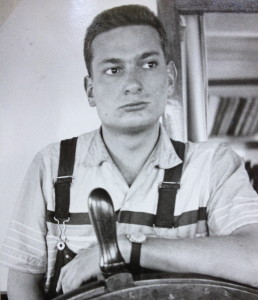We had many discussions about religion, chief engineer Wilhelm Hults and I. We stood at the rail, moonlit Baltic Sea rushing past and throwing whitecaps against the ship’s hull. We sat way past dinner in the mess room, shared by officers and crew on the coastal steamer “Vegesack.”
Years of salt spray and tropic suns had furrowed his brown skin, turned his goatee silver-white. Crawling in the belly of ships, ducking between gauges and hissing pipes into dark oily niches had squinted his eyes and sharpened his vision. Like Socrates and Zen masters of the ages, Wilhelm posed questions with a bemused smile and left the answers up to me.
Yes, I’ve been thinking in the last four years since I had gained self-consciousness at age fourteen. Proof lay in the diaries, charting my quest for meaning in the universe, adolescent oats and girls’ coquettish smiles, dreams of pirate islands, disdain for enslavement of the soul, whether by police states, fathers or Greek gods.
What I thought or felt was important, because that’s where I lived, that’s who I was. I had rejected higher powers since Zarathustra spoke. Yet, every Sunday the obedient son had trotted off to church as he was told. I and my mischievous cohorts played war in the Augsburg woods, then returned home with a pack of lies about the supposed events at church. One day my father, who didn’t go to church, quizzed me sternly. I mocked that the pastor’s sermon concerned hypocrites who preached religion, but didn’t go to church.
Wilhelm Hults did not judge me by what I could do for him. He did not correct my spelling in any notes I might have left, as my father had done. Engineer Hults seemed to foment my autonomy, while enjoying my befuddlement with his questioning.
Here I was, six months out of school, steering a ship through ice floes into Swedish ports, drinking vino tinto all night with party-girls in Santander, spitting into English Channel fog while standing watch at the freezing bow.
Yes, what I thought mattered. I was the center of the universe. Wilhelm Hults gently confirmed that I had the power to decide. One morning out of Goeteborg, I arose and filled out the form in triplicate to cancel my religious affiliation and stop paying the monthly two Mark sixty Pfenning tax. In his next letter, my father wrote angrily: “What are they teaching you there at sea?..And who is this Wilhelm Hults?!”
I broke other chains before my nine month hitch was up. Was busted by customs officers in Lulea near the northern lights for smuggling rum and cigarettes.
“Har du sprit?” alcoholic Swedes would call up from the pier.
Yes, I had liquor. “Har du penga?” – You got money?
The German Bundeswehr meant to draft me for two years of service for the fatherland. But I was already an expatriate, had other notions for my life. I was going to paint in Paris, run with Pamplona bulls.
“I have too much ballast…Travel light.”
With those words I shucked my diaries overboard.
– Published here for the first time, this piece was written during the Haystack Writers Program. It is drawn from a true story when the author served in the German merchant marine. The captain’s name was altered in homage to the late Billy Hults, who “got a chuckle” when he read it.

Next time you’re in Cannon Beach, Tony, let’s hoist a couple of frothy pints to Engineer Hults. Readers are fortunate to have this well-crafted prequel to your Paris Beat. What a slice of life!
I find it both inspiring and humbling to reflect on life’s turning points. Thank goodness for the folks who help us learn how to steer. You pass along that gift when you write about it.